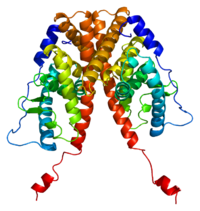
Photo from wikipedia
Spermatogenesis is a complex process that requires precise regulation. Phosphorylation plays a role in spermatogenesis by regulating protein structure and activity. This study focused on cyclin‐dependent kinase 7 (CDK7), and… Click to show full abstract
Spermatogenesis is a complex process that requires precise regulation. Phosphorylation plays a role in spermatogenesis by regulating protein structure and activity. This study focused on cyclin‐dependent kinase 7 (CDK7), and explored its function and molecular mechanisms in spermatogenesis in vitro in a cell line and in vivo in a mouse model. Inhibition of CDK7 activity affected spermatogonia proliferation and differentiation, and we found that CDK7 regulates retinoic acid (RA)‐mediated c‐KIT expression to play a role in spermatogonia. Then, we demonstrated that inhibition of CDK7 affected meiosis initiation, DNA repair, and synaptonemal complex formation in meiosis progression, and CDK7 played this role by regulating RA‐mediated STRA8 and REC8 signaling pathways. Moreover, inhibition of CDK7 impacted spermatid differentiation and resulted in decreased counts, decreased motility, and increased head deformity of sperm. We demonstrated that CDK7 affects germ cell apoptosis and sperm motility by activating STAT3 and that STAT3 further regulates Cortactin expression to influence the nuclear elongation, chromatin condensation, and acrosome formation of sperm. Additionally, EP300 was identified as another potential target phosphorylated by CDK7 that participates in chromatin condensation. Our results demonstrated the important role of CDK7 in all key aspects of spermatogenesis, potentially providing an effective target for clinical diagnosis and pathogenesis.
Journal Title: IUBMB Life
Year Published: 2021
Link to full text (if available)
Share on Social Media: Sign Up to like & get
recommendations!